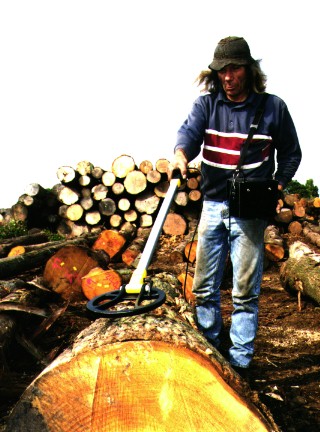New Press
Information

Precise Metal Detection in Timber
Protovale Oxford Ltd
Protovale Oxford Ltd was formed in 1978 and initially specialised in the production of equipment for the timber industry. Since then it has diversified and now also manufactures a range of portable detectors for the utility and construction industries.
Stability, reliability, simplicity of use, robust construction and an awareness for what the customer really wants: adherence to these principles has earned the British company, Protovale Oxford Ltd, a reputation as market leaders in the production of industrial metal detectors.
It wasn’t easy for Protovale to convince the timber industry that metal detectors could really work for them. Too many people had tried to use hobby equipment and had quickly found that they weren’t providing the answers they were looking for. The instruments were often wildly unstable and over-sensitive to moisture and temperature changes. They were unstable near machinery, unable to work near overhead powerlines and many could not locate shrapnel. Not surprisingly, potential customers were often sceptical that Protovale’s instruments could be any better.
But more that 20 years of industrial approval can testify that they are significantly better.
Behind their remarkable performance is the pulse induction technique, first developed and used by the company’s Technical Director, John Alldred, for non-destructive testing of archaeological finds.
Most other metal detecting equipment involves a current being passed continuously through the search head and the presence of nearby metal is indicated by minor variations in the signal. But it isn’t just the metal target that can cause these variations, they can also be caused by electrical interference, temperature changes - or even the earth’s own magnetic field. To compensate for these minor variations, the instrument may need frequent re-zeroing and even then it is often hard to get a stable reliable reading.
However, with Protovale’s technology, if there is a metal object there will be a signal and if there isn’t - nothing! This makes the Protovale range well suited for industry use where conditions are seldom ideal. And because they are also extremely easy to use and solidly built, they can save considerable time and, therefore, money.
Protovale make two main instruments for the timber industry, the TotalScan and the Versatile Imp, both of these have successfully been used through out the world.
The TotalScan was specifically designed for locating metal deeply embedded in hardwoods. Using the TotalScan will reduce mill downtime and saw doctoring costs that are the consequences of bandsaws hitting metal.
Originally known as the TS2, it has now been superseded by the TS8 with upgraded electronics and a much stronger handle.
Steven Blackwell from Helmdon Sawmills in Brackley, UK said:
“You don’t have to hit many pieces of metal to see how much you could save with the TS8. I don’t think you can improve on it. It’s a useful and precise instrument”.
The Versatile Imp is (as its name implies) very versatile, it has a range of four different search heads and is able to locate a wide variety of both ferrous and non-ferrous metal. Its applications range from pinpointing nails in reclaimed timber to finding metal in the stomachs of cows.
It has also been used in forest applications. Back in 1996 the Versatile Imp was used deep in the forests of Northern Russia.
Mikhail Buyov, who controlled all the felling and logging operations from the White Sea to Finnish Border, South of Murmansk, commented that he was very pleased with the Imp’s ease of operation, its accuracy and stability, and that fact that it was unaffected by the snow.
Oxford-based reclaimed timber furniture manufacturers, Splinters, bought a versatile Imp metal detector after suffering a succession of costly setbacks when saw blades struck metal in the timber they were using. Splinters use reclaimed wood to make furniture, kitchens and fire surrounds.
Mr Philip Crowther said:
“Before we came across Protovale, we tried other metal detectors but none of them were as deep-seeking as the Imp. They could cope with metal near the surface but nothing deeper down than that. Also, the Imp will pick up minute pieces of metal like the ends of nails.”
“We had lots of trouble before, not just on our own equipment. We sometimes contracted out sawing or planing. Not only did we have to pay them for their blades if they broke or were damaged but we were paying for their lost working time. Sometimes they would insist that we went over to check the wood before they would continue”.
But Splinters have not encountered such problems since they acquired the Imp. If checking is done correctly and systematically then they have found the Imp 100% accurate and would recommend it to anybody working with wood that is likely to contain metal.
|
For more information on this Press Release, contact: Karen Roberts, Protovale Oxford Ltd Rectory Lane Trading Estate Kingston Bagpuize, Abingdon, Oxon OX13 5AS Tel: +44 (0) 1865 821277, Fax: +44 (0) 1865 820573 Email: marketing@protovale.co.uk |